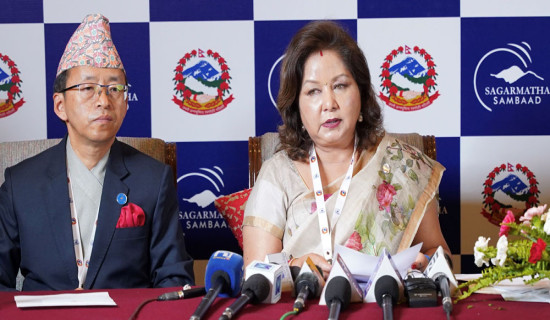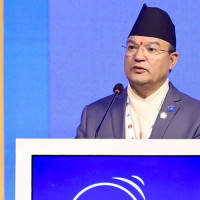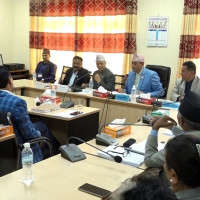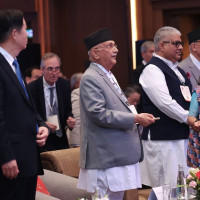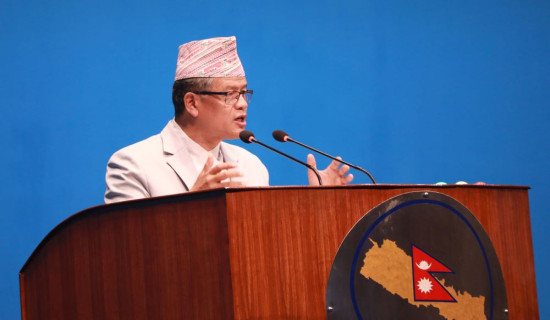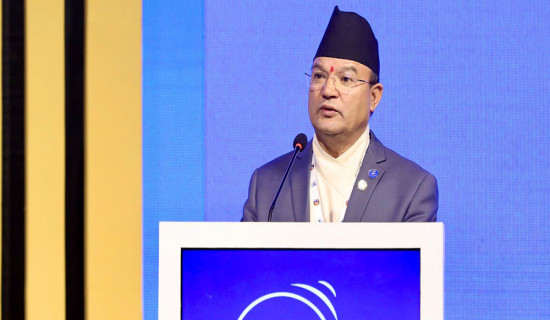- Friday, 16 May 2025
Mountains are humanity's shared global resources: Foreign Minister
Kathmandu, May 16: Minister for Foreign Affairs Dr Arzu Rana Deuba has described the mountains as humanity's shared global resources.
In her welcome statement in the
Opening Session of the Sagarmatha Sambaad, organized for the first time here on
the theme of 'Climate Change, Mountains and the Future of Humanity', she said
the mountains are the source of fresh water to millions of people.
Stating that the Himalayas are
bearing the greatest burden of climate change-induced stressors today, she
noted that the rate of glacier melting due to climate change effects has
significantly increased. Minister Rana mentioned that this has negatively
impacted the daily lives of the mountain communities.
"Mountains store and supply
freshwater, act as natural carbon sinks and are home to breathtaking
biodiversity and abundant natural resources. They offer an array of sustainable
climate solutions in the form of reforestation, watershed protection and
eco-tourism," she stated.
Reminding that the climate
change-induced disasters have shaken the very foundation of human existence and
livelihoods, the Foreign Affairs Minister said the floods and glacial lake
outburst triggered by climate change impact has caused a big damage, and the
droughts, water scarcity and forest fires has given untold suffering.
"The Sambaad provides an
occasion for reflection and introspection and aims to encourage meaningful
conversations on matters that matter to us all, from the mountains to the seas,
and from the Global North to the Global South," she added.
Noting that the Himalayas, in
particular, are facing an unprecedented stress test in real time today, exposing
not only the fragile nature of our mountain ecosystems but also a glaring
evidence of the lack of meaningful global climate action, she said Nepal, as a
mountainous country, is forced to face a heavy and disproportionate burden of
the negative impacts of climate change.
"Yet there are incredible
examples of many local communities fighting strenuously against climate change.
Women, indigenous people, youth, and marginalized groups- especially in
mountain regions- are the gentle caretakers of our natural world. They fight on
the home ground and they know how to fight a long fight."
The Minister for Foreign Affairs
stressed on the occasion that recognizing and giving value to their local
knowledge and lived experience is critical to building adaptive and sustainable
communities, as is empowering them with resources and opportunities for finding
sustainable solutions to an existential crisis.
Nepal has committed to achieving
the target of net zero greenhouse gas emissions by 2045. Hydropower, a clean
form of energy, has remained Nepal's largest source of electricity.
Minister Dr Rana shared community
forest, a natural resource management programme pioneered by Nepal, has not
only helped Nepal enlarge its forest cover significantly but has also emerged
as a model of participatory conservation the world over.
"Climate change is a global
crisis transcending national boundaries. Nothing less than a global alliance
based on justice and solidarity can hope to make a dent on the existential
crisis that climate change brings in its wake", she mentioned, adding so
we call for a sufficient and effective loss and damage fund that could be
easily accessed by countries in crisis.
The Foreign Minister added that the
world should acknowledge the vulnerabilities of countries like Nepal as well as
support targeted mitigation and adaptation strategies through the provision of
climate finance, adaptation support and technology transfer.
Nepal has therefore been
consistently at the forefront of advocating for climate justice in
international forums and multilateral institutions, she opined.
Minister Rana argued that this
forum would be an opportunity to contemplate on the linkage between climate
change and regional and international peace, security and stability as well as
the impacts of climate change on migration, food security, humanitarian crisis
and disaster risks.
She expressed the belief that the
Dialogue would help spark fresh ideas, foster cooperation and mobilize greater
political willpower in combating the specter of climate change and the
existential threat to the future of humanity. (RSS)



